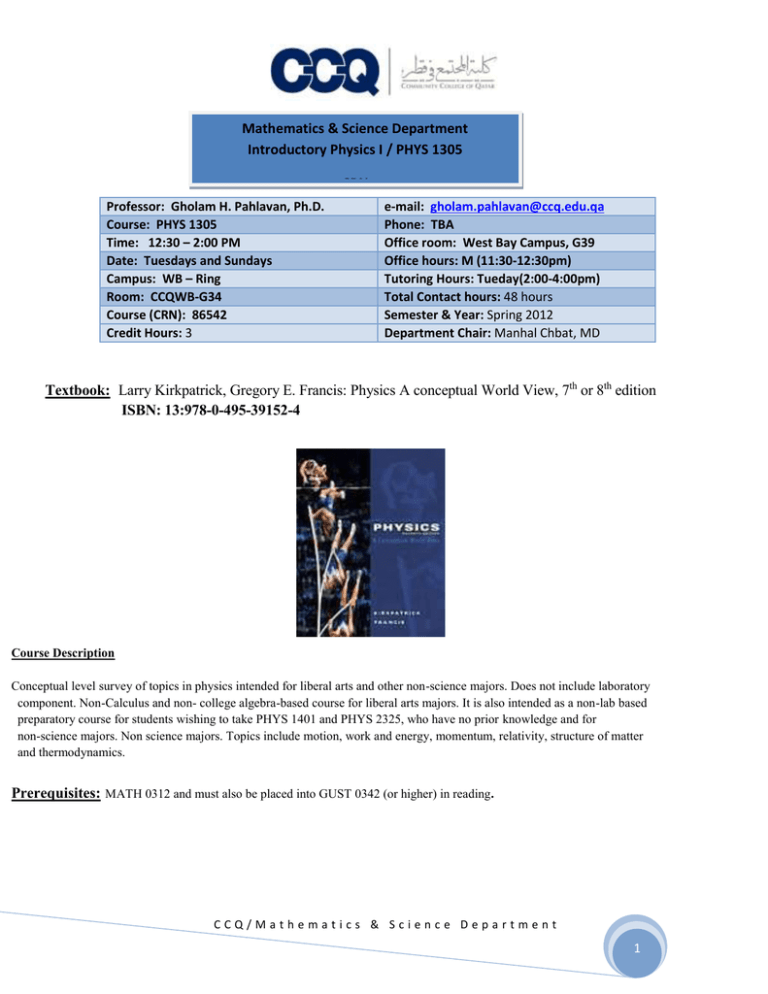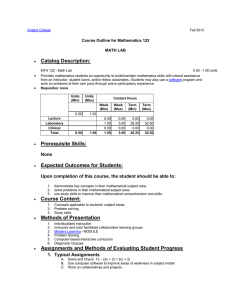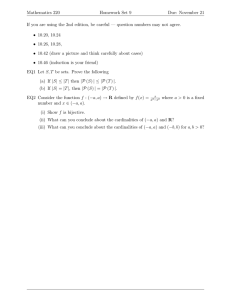PHYS 1305 Syllabus (UT) CCQ Spring 2012.doc
advertisement

Mathematics & Science Department Introductory Physics I / PHYS 1305 CRN 2012 gholam.pahlavan@ccq.edu.qa Professor: Gholam H. Pahlavan,Spring Ph.D. Semestere-mail: Course: PHYS 1305 Time: 12:30 – 2:00 PM Date: Tuesdays and Sundays Campus: WB – Ring Room: CCQWB-G34 Course (CRN): 86542 Credit Hours: 3 Phone: TBA Office room: West Bay Campus, G39 Office hours: M (11:30-12:30pm) Tutoring Hours: Tueday(2:00-4:00pm) Total Contact hours: 48 hours Semester & Year: Spring 2012 Department Chair: Manhal Chbat, MD Textbook: Larry Kirkpatrick, Gregory E. Francis: Physics A conceptual World View, 7th or 8th edition ISBN: 13:978-0-495-39152-4 Course Description Conceptual level survey of topics in physics intended for liberal arts and other non-science majors. Does not include laboratory component. Non-Calculus and non- college algebra-based course for liberal arts majors. It is also intended as a non-lab based preparatory course for students wishing to take PHYS 1401 and PHYS 2325, who have no prior knowledge and for non-science majors. Non science majors. Topics include motion, work and energy, momentum, relativity, structure of matter and thermodynamics. Prerequisites: MATH 0312 and must also be placed into GUST 0342 (or higher) in reading. CCQ/Mathematics & Science Department CCQ/Mathematics & Science Department 1 Student Learning Outcomes (SLO) At the successful completion of this course students should be able to: 1. Explain the basic concepts of one and two dimensional motion and solve very basics related problems on these concepts, 2. Describe the concepts involved in gravity and work very basic related problems, 3. Show their comprehension of the fundamental principles momentum, energy and relativity, by explaining the basic concepts involving these principles in their own words and working basic problems using appropriate equations from these principles. 4. Describe the structures and the states of matter in their own words 5. Explain temperature, expansion, heat contents and the first and second law of thermodynamics, in their own words. A score of 70% and above in examinations and assignments would constitute their mastery of these fundamental physics principles with very little mathematical applications. Student Learning Objectives (SLO) 1.1 Introduction World View of Physics 1.2 Description and explanation of Motion 1.3 Description of Motion in space 1.4 Explanation of how the force of gravity affects motion 2.1 Explanation and description of the concepts of linear momentum, impulse, and collisions, including elastic, inelastic and glancing collisions 2.2 Explanation of the various types of energy including kinetic and potential 2.3 Explanation of Rotational Motion, torques and angular momentum 3.1 Explanation of Classical Relativity 3.2 Explanation of Einstein Relativity 4.1 Description of the structure of Matter 4.2 Explanation of the States of Matter 4.3 Explanation of Thermal Energy 4.4 Explanation of Available energy CCQ/Mathematics & Science Department CCQ/Mathematics & Science Department 2 Instructor guidelines and policies a. b. c. d. e. Cell Phones and Other Electronic Devices - The use of cell phones and other electronic devices in the classroom is not permitted without the specific approval of the instructor. In general, all cell phones and other electronic devices must be turned off while in the classroom. Students who violate this policy will be given a warning for the first offense, but any additional violations may result in the student being asked to leave the classroom for the day, which will be counted as an absence. Repeated violations may result in the permanent expulsion and withdrawal of the student from the class for the semester. Classroom Disruptions - Disruptive behavior in the classroom is not permitted. Disruptive behavior is defined as any actions by a student that interferes with teaching and learning in the classroom. Examples include talking to other students while the instructor is lecturing or answering questions, speaking disrespectfully to the instructor or to other students in the classroom, or engaging in any type of disruptive behavior that compromises the learning process. Students who violate this policy are subject to disciplinary action up to and including expulsion from the course and the college. Tardiness - Students are expected to arrive to class on time and to be prepared for the learning process. Tardiness is defined as entering the classroom after the commencement (start) of the class by the instructor. Three (3) incidents of tardiness will be counted as one absence. If you arrive late, take your seat quietly and get to work. Coming in to class more than 15 minutes late will be counted as an absence. Withdrawals - Class attendance is critically important for student learning and success. Students who are absent from class more than 12.5% of the total number of class hours for the semester may be withdrawn by the instructor. As examples, if your class has the following contact hours, the number of hours that may be missed before penalties occur may be calculated as follows: 48 contact hours 64 contact hours 80 contact hours 48 x 12.5 = 6 64 x 12.5 = 8 96 x 12.5 = 12 Please be advised that the decision to withdraw a student is the prerogative (right) of the instructor and is a standard practice among colleges and universities throughout the world. Students who are not withdrawn from class are still subject to points being subtracted from their final grade in accordance with the student handbook. Attendance - Successful students attend school every day. Classes that meet four times a week: CCQ expects you to attend all of your classes every day that they meet. There are no excused absences, even if you are sick or must work. If you miss more than 6 classes, you will lose 3 points from your final grade for every class missed thereafter. You must complete all work, assignments and tests that you miss. You are responsible to keep up with class work and assignments. Get the mobile number of several classmates so if you miss a class, you may follow up with your classmates about assignments. If you stop coming to class, you must see a Counselor to drop your class before the Drop Deadline or you will receive an F. ESL students must drop all of their classes; College students may drop individual classes. CCQ may grant exceptions to these policies for special circumstances such as extraordinary or prolonged illnesses and family emergencies. CCQ will not grant exceptions for work related absences. Successful students submit all their assignments on time, work individually on their homework, and are expected to follow the professor deadlines for any required work. You will lose 10 points if your assignment is 1 day late, 20 points if your assignment is 2 days late, and 30 points if your assignment is 3 days late. Assignments later than this will not be accepted. As stated in the Student Handbook, cheating is definitely not tolerated. Students must not cheat during a quiz or test. Cheating includes talking to another student, looking at another student’s paper, using a small paper with answers or using a mobile. For written assignments, students must not copy from another student unless assignment requires work with other students. If a student copies from another student, both students are responsible for cheating. Math Tutoring: If you feel like you’re struggling on needs help with the lesson(s), you may come to my office during office hours (or by appointment) for tutoring or contact the tutoring coordinator to set up an appointment. CCQ/Mathematics & Science Department CCQ/Mathematics & Science Department 3 TENTATIVE COURSE CALENDAR *The instructor reserves the right to deviate slightly from this syllabus for the purpose of better serving the needs of the students. U Jan. 08 T Jan. 10 U Jan. 15 T Jan. 17 U Jan. 22 T Jan. 24 U Jan. 29 T Jan. 31 U Feb. 5 T Feb. 7 A World View: Begin Chapter 1 Conclude chapter 1 Begin Chapter 2 ( Describing Motion) Conclude Chapter 2 Begin Chapter 3 ( Explaining Motion)Conclude Chapter 3 – Begin Chapter4 (Motions in Space) Conclude Chapter 3 Begin Chapter4 (Motions in Space) Conclude Chapter 4 (Review for exam # 1) Exam #1 (Chapter 1- 4) Begin Chapter 5 – Gravity U Feb. 12 T Feb. 14 Conclude Chapter 5 Begin Chapter 6 ( Momentum ) U Feb. 19 Conclude Chapter 6 - Begin Chapter 7 (Energy) T Feb. 21 Conclude Chapter 7 U Feb. 26 Begin Chapter 8 (Rotation) T Feb. 28 U Mar. 4 T Mar. 6 Conclude Chapter 8 (Review for Exam #2) Exam # 2 (Chapter 5-8) Begin Chapter 9 (Universality of Motion-Classical Relativity) U Mar. 11 T Mar. 13 Conclude Chapter 9 Begin Chapter 10 ( Einstein’s Relativity ) U Mar. 18 Conclude Chapter 10 T Mar. 20 Begin Chapter 11 (Structure of Matter ) U Mar. 25 Conclude Chapter 11 W Mar. 27 Apr. 1-7 U Apr. 8 T Apr.10 Review for Exam #3 Spring Break Holiday Exam #3 (Chapter 9-11) Begin Chapter 12 ( States of Matter) U Apr. 15 T Apr. 17 Conclude Chapter 12 Begin Chapter 13 (Thermal Energy ) Note - April 19, Tuesday – Last day for administrative Withdrawals 2:30 pm Conclude Chapter 13 Review For Final U Apr. 22 T Apr. 24 U Apr. 29 Final Exam – Sunday 4:00-6:00pm CCQ/Mathematics & Science Department CCQ/Mathematics & Science Department 4 Instructional Methods This class will be lecture and class participation. Mathematics cannot be learned without actually doing it. You will need to be prepared to work every day in class. Student Assignments There will be 3 Exams and Frequent quizzes at the beginning of class. If you are late you will miss these and your grade will suffer. Assessments A B C D F Grading Scale 90 – 100 80 – 89 70 – 79 60 – 69 59 and below Grading Computation Exams and other assignments Percentage % Tests 45(15% each) Homework 15 Quizzes 10 Participation and class work 5 Final Exam 25 Total 100 CCQ/Mathematics & Science Department CCQ/Mathematics & Science Department 5


